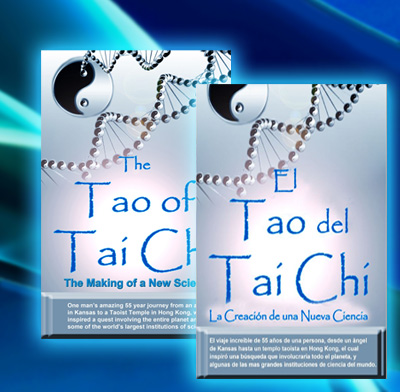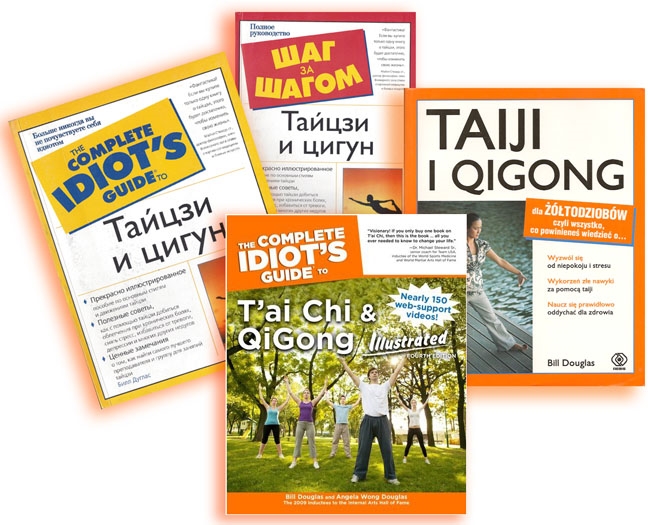BALANCE DISORDERS and Tai Chi & qigong
BALANCE DISORDERS and TAI CHI!
T'ai Chi practitioners fall only half as much as
those practicing other balance training,
as
reported by an Emory University study, and
others.
EMORY REPORT "Tai Chi Training May Reduce Falls in the
Elderly"
Try tai chi to
improve balance, avoid falls
Posted August 23,
2012
Stephanie Watson, Executive Editor, Harvard
Women's Health Watch
Compared to the pumping
intensity of spin or Zumba, a tai chi class looks like it's
being performed in slow motion. Watching the gentle, graceful
movements of this ancient Chinese practice, it's hard to
imagine that tai chi can burn off a single calorie or
strengthen muscles. But this exercise program is far more
dynamic than it looks.
"The slowness that you see from
the outside can be deceptive," says Dr. Peter Wayne, research
director of the Osher Center for Integrative Medicine at
Brigham and Women's Hospital and Harvard Medical School.
Read entire article at:
http://www.health.harvard.edu/blog/try-tai-chi-to-improve-balance-avoid-falls-201208235198
Tai Chi May Help Seniors Avoid
Falls
Fitness, Flexibility, Balance, and
Confidence Improved in 12-Week Study
June 28, 2005 --
Tai chi, an ancient Chinese martial art, may improve senior
citizens' strength and help them avoid falls, South Korean
researchers find.
. . . The researchers tested tai chi
in older adults. The slow, gentle, and continuous movements
help them develop stronger muscles, better balance control,
concentration, and psychological well-being.
More on this research and balance . . .
They found
benefits including:
· Stronger knees and ankles
· Better balance and flexibility
· Improved walking
· More confidence in the ability to avoid falls
The
tai chi students had fewer falls than others who didn't take
the class.
. . . Their study appears in the
Journal of Advanced Nursing.
About Tai
Chi
Tai chi uses slow, fluid body movements. It's not a
jarring form of exercise.
Tai chi has gotten attention
from scientists for nearly a decade. The first two tai chi
studies funded by the National Institute of Aging were
published in 1996.
Those studies found many of the same
benefits as seen in the new South Korean study.
. . .
Falls in Seniors
Every year, about 30% of people aged
65 and older -- and living on their own -- fall. Falls are
more common in long-term care facilities, where 40%-50% of
residents fall in any given year. Some of the risk factors
that lead to falls in seniors include imbalance, muscle
weakness, and lack of flexibility -- all of which are
modifiable, they write.
. . . Strength, Flexibility,
Balance
The 12-week program was finished by 29 tai chi
students and 30 people in the comparison group.
The tai
chi students had stronger knees and ankles than their peers.
They also improved in flexibility and walking.
SOURCES:
Choi, J. Journal of Nursing, July 2005 vol 51: pp 150-157.
News release, National Institute on Aging. News release,
Journal of Advanced Nursing.
Institute of Chicago indicates that people with
moderate balance problems can be helped by practicing T'ai
Chi. Participants...of the 2 month course ...experienced about
a 10 percent improvement in balance. An Emory University study
supports Hain's findings. Prevention Magazine V. 46 Dec. 94 p.
71-72
Harvard
Health Publications
Falls Prevention. An Emory
University study found that 48 weeks of Tai Chi reduced the
fear of falling significantly compared to a wellness education
program. An earlier study reported a significatnly greater
reduction in fear of falling following Tai Chi compared to
computerized balance training: improvements in fear of falling
were correlated with a nearly 50 percent reduction in the fall
rate. Another trial reported that the combination of cognitive
behavioral therapy (CBT) plus Tai Chi improved fear of
falling, as well as measures of mobility, social support
satisfaction, and quality of life, more than CBT alone.
Read more at Harvard Health Publications ...
Harvard Health Publications
Proprioception
(Ability to sense the position and location and orientation
and movement of the body and its parts). One study compared
long-term Tai Chi practitioners to age-matched swimmers,
runners, and sedentary controls. The Tai Chi practitioners had
a better sense of the position of their ankle and knee joints
in space, and were more sensitive to small movements of their
joints. So, Tai Chi may give you more accurate, quicker
feedback for balance and posture, which could help prevent
falling. (Harvard Medical School Guide to Tai Chi. Page 118.)
Read more at Harvard Health Publications ...
FIND MUCH MORE RESEARCH AT THE "QIGONG INSTITUTE DATABASE"
Since 1984, collecting breaking medical/science research on
Qigong, Tai Chi, Yoga, and Mind-Body Education
Click here
for Qigong Institute Database...
* NOTE: World Tai Chi & Qigong Day advises
consulting your physician before beginning any new exercise,
herbal, diet, or health program. The research listed here is
meant to stimulate a discussion between you and your
physician, health insurance carrier, etc., not as medical
advise. Research and comments provided here are hoped to
stimulate a more robust discussion of powerful natural
mind/body health tools. Popular media, health media, and
government must increase attention to stunning emerging
research, including the UCLA study indicating Tai Chi
participants enjoyed a 50% increase in immune system
resistance to viral infection.
- To learn more about tai chi & qigong medical research,
see the below book,
"the complete idiot's guide to tai chi & qigong,", and also
"Harvard Medical School Guide to Tai Chi," and
"The way of qigong: the art and science of chinese energy healing."
Click to purchase this acclaimed best-selling Tai Chi book, with nearly 150 web-video support videos for the detailed text/illustration instruction as a "gift of health" for loved ones.
A new paradigm in multi-media educational books.
"Visionary! If you only buy one book on T'ai Chi, then this
is the book. This book is all you ever needed to know to
change your life. I have taught T'ai Chi for several decades
myself, yet I have now read Bill's book from cover to cover
seven times, and still get something new from it each time."
– Dr. Michael Steward Sr., D.MA, Ph.D., MA, Senior
Coach for Team USA, Inductee of the World Sports Medicine and
World Martial Arts Hall of Fame
"Sometimes Chinese
culture can be difficult to explain. Sifu Bill Douglas
successfully uses American culture to explain the art of T'ai
Chi Chuan. He simplifies difficult concepts, making them
easier to understand. This book takes the best parts of T'ai
Chi and makes them understandable [to Westerners] without
requiring a grounding in Chinese culture and history."
– Sifu Yijiao Hong, USA All-Tai Chi Grand Champion and USA
Team member; Certified International Coach and Judge,
International Wushu Federation
"Douglas has
achieved for QiGong what Apple did for the computer. He's
brought it to the people … great place to start for beginners.
… Teachers may also find this an excellent manual 'on how to
explain these concepts to the general public…'"
– R.
Poccia,
"The Tao of Tai Chi: The Making of a New Science" (now available in both English and Spanish))

Harvard's Dr. Peter Wayne discusses Tai Chi, Qigong and Bio-Energy with Neuro-biologist, Dr. Richard Hammerschlag,
with WORLD TAI CHI & QIGONG DAY ONLINE SUMMIT HOSTS
World Tai Chi & Qigong Day's series of Official ONLINE
SUMMITS, have brought some of the top minds in Tai Chi, Qigong,
and cutting edge scientists researching Mind-Body practices.
World Tai Chi & Qigong Day's global health education work was
recognized on page 25 of "The Harvard Medical School Guide to
Tai Chi" ...
A reflection of how successful the invasion
has been is World Tai Chi Day, organized by Bill Douglas. One of
the purposes of this day is ‘to bring together people across
racial, economic, religious, and geo-political boundaries, to
join together for the purpose of health and healing, providing
an example to the world.' Millions of people around the world –
65 nations participated in 2011 – gather one day each year to
celebrate the health and healing benefits of Tai Chi and Qigong.
— The Harvard Medical School Guide to Tai Chi (page 25)
Harvard Medical School Researchers Launch 'Tai Chi as Therapy' Lecture to Commemorate World Tai Chi Day
The new Harvard Medical School Guide to Tai Chi is a powerful
reference book for all tai chi and qigong advocates, teachers,
etc. The Harvard Guide cites WorldTaiChiDay.org's work in
expanding global awareness of tai chi and qigong!
Our
efforts have exposed over ONE BILLION potential viewers/readers
of mass media to Tai Chi and Qigong and its myriad health
benefits, via our annual WTCQD worldwide events.
